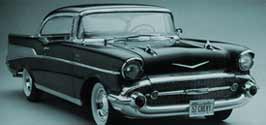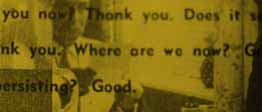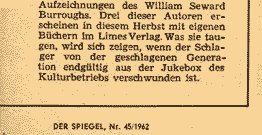 |
 |
 |
 |
Is there something like cultural symmetry? Minds working in similar directions, events taking place in patterns that seem parallel despite of geographical separation? There are sidereal hours in history that indicate a hidden law of synchronism or Serialism (a term used by John W. Dunne for "displacement in time").
Germans/Europeans love the word "culture". In German there is even an expression saying: "He or she has culture." As if culture were an object you can possess, & indeed it is a term expressing possessive culture, culture that is possessive. A standard of social existence & of cultural identity.
The man I consider a cultural mentor is a man from Prague, from pre-war Prague. Being Jewish he had to leave Prague which up to that point was to its colony of intellectuals & artists the cultural center of their world. It was a world in itself. (His name is Vilém Flusser, & he went to England & then to Brazil returning in the 70s to Europe. A migrant in the best sense of the word.) |
|
 |
|
Perhaps because of my own biographical experience I have little respect for people who never left the Old Continent mentally, culturally. World War II forced many of the best minds of the pre-war generation into exile & brought cultural migration into focus as a way of survival under increasingly movable conditions that mark the 20th century. Exile or the notion of escape echoed on for many of the generation growing up after the war. "Escapism" later evolved as a literary category.
To speak of & work with the term generation presupposes a fictitious fabrication. While the exposure to historical events is mostly collective & fate, the reactions & the results that follow are not. They are processed by personal, individual patterns. I therefore use my own experiences as an example how mind shifts, thought lines & experiments in search of cultural identity took shape in post-war Germany. |
|
I was 10 when the war ended. It did not end then, really; in a way the real conflicts only began. The war had not only destroyed people & cities but it had destroyed what was up to then known as European culture. Nazi atrocities had wiped out the European Jewry not only physically but at the same time culturally (like the Yiddish language & everything that came out of it). The destruction of Prague stood as a symbol of the annihilation of middle-European urban culture.
In the words of William Burroughs: "You can write or yell or croon about it...paint about it...act about it...shit it out in mobiles...So long as you don't go and do it..." If you can start writing anywhere why not here?
A wide open field for the disillusioned...
The war had left no images that could be used as a derivative for personal connotations or be molded into a mythology of liberation from past structures.
Growing up with the background of mostly unspoken & hardly grasped devastations did not allow continuity. The rebellious form of realizing this was denial of continuity. Only later it became apparent that continuity itself had vanished, & without continuity the very structure of reality loses stability. The result is an inversive culture shock, not inflicted by contact with an unknown outside environment but by realizing the incomprehensible within.
What does this have to do with writing? Nothing. Writing is not a cultural reflection (or a comment on a cultural situation), it is a form of personal expression, or is it? An epilogue of thought lines in search of cultural identity especially where continuity has been broken... If cultural consciousness has little to do with writing, this situational background has a lot to do with becoming a writer. You cannot write under 20th century Western conditions without a cultural identity. Or without renouncing a cultural identity. Both are aspects of the same orientational problem. Adorno had phrased the term of the impossibility of writing poems after Auschwitz. (Later, a similar inversive shock was inflicted by the Russian invasion of Czechoslovakia in 1968.) Assuming a thesis of cultural symmetry, the same could be said in respect to writing novels after Hiroshima (the anxiety & terminal fear about a nuclear disaster seems ever present to me in the structure & subjects of Naked Lunch by Burroughs. "In the Control Room instrument panels are blowing out...great streamers of electricity crackle through the room...The Technician, naked, his body burned black, staggers about like a figure in Götterdämmerung, screaming: `Thubber thonic!! Oth thu thair!!!' A final blast reduces the Technician to a cinder.").
For me there was a single close encounter with war. I was living near a military airfield, & one day it was strafed by American airplanes. After the attack I went with a group of boys to look for cartridges. One aircraft came back literally out of the blue sky & started firing rounds at us (or the airfield). I had to duck.
Shortly thereafter the war was over & life went on. I did not think of cultural identity when I started to write. There was nothing to start from or to go against. Or you could start from anywhere, & identity could only be defined negatively, as a rebellious form of organizing diversities. The past seemed like a big black hole that would destroy anyone who got close to it. Writing was but a primal urge, a necessity of psychological survival. There were no references, & there was no direction that seemed worthwhile to pursue. Subjectively there were no identification marks, no established standards of cultural consciousness. The inversive shock put me in a regressive spot where an anti-aesthetic force confronted the subconscious. The very notion of any kind of presence was constantly at stake.
Perhaps this could be called a state of being that became known as Existentialism which governed French philosophical thinking during & after the war. It grew out of the experience with occupation & resistance & turned into an urban lifestyle in the post-war era.
Suddenly, in the late 40s & early 50s, Western cultural setting became a wide open field that was abundant in all respects & became apparent in literature, film & music, revealing patterns of perception with references to the invisible. Rather a search than the disclosure of discoveries. Discontinuity was dominant but spots of continuity (or anti-continuity) surfaced.
It was not only the present that spread out like a stage with diversified artistic array (like Henry Miller, Thornton Wilder, William Faulkner, Ernest Hemingway, Robert Musil or Albert Camus) but also the past with fractual reverberation from Dada, Expressionism & Surrealism. Any ardent reader could get lost in an Odyssey of identity by plunging into emerging treasures of aesthetic excavations. Transmigration of identity became the vehicle to steer clear of dangers that faced the (artistic) self. |
|
|
|
|
| Meanwhile the 50s had arrived with their disappointing restorative tendencies, canonized anxiety & the fear of nuclear recourse. They were especially bitter for German intellectuals who had hoped & worked for a basic change in political & hence cultural conditions (that were preconditioned by Socialist thought). These aspirations could not be reconciled with the requirements of the Cold War situation. Not artistic orientation was now the predominant strive but the search for a "plan of living" (Lebensgefühl). With democracy, the political system had changed but that had little effect on everyday living & the social climate. Conditions on the personal & individual level (like school, family & the structure of institutions) were still authoritarian. Life in the 50s could not satisfy any expectations for breaking away from past misgivings but more important it left no room for a newly awakened craving for civil liberties & personal realization & awareness. |
|
At that time the literary scene in Germany was dominated by the Gruppe 47, a conglomerate of writers, critics & publishers that held yearly meetings of literary readings & discussions. A forum that could make or break a writer (& indeed provided an encouraging platform for Günter Grass, Martin Walser, Heinrich Böll). But by carefully mapping a consensual standard, it could not give rise to expectations of any real artistic or aesthetic innovations, & that seemed to be the reason why writers like Arno Schmidt who insisted on artistic autonomy stayed away. It turned out to be an in-group, an establishment within the establishment which could make or break a writer appearing at its annual meetings. At the core it paved the way for a new mainstream that acted as a regulatory on all levels of the literary media scene to this day. (Ironically the group vanished at the first sign of a demonstration of student protest in the 60s.)
Another mistaken cultural identity, if you want. Where to go from here? That was & still somewhat remains the question. The 50s turned out a wave of normality that covered up most unanswered questions & cultural uneasiness. Vergangenheitsbewältigung, a bastard of a word for coming to grips with the flaws of an incommensurable past, was left to politicians & Sunday speeches. It would have required a delicate & fundamental instrumentarium of thinking & philosophical consideration to make the unspeakable speakable. Instead, a language of avoidance & omission emerged as the safest route to take & an easy way out. A literature of safekeeping evolved whose proponents were writers like Heinrich Böll & Max Frisch. Perhaps their writing strived on the Lebensgefühl of a beaten & intimidated generation that had been to war enthusiastically or at least without second or third thoughts & was now disillusioned, morally uprooted & beaten to a sense of disorientation. The end of the war had also disrupted the urge to look back on what little continuity was worth considering. This resulted in a tragic ignorance of how the emigrants (or refugees) had survived their existential separation & what their contribution was to a basic 20th Century experience of inner & outer migration (like Alfred Döblin & Hans Sahl. Both never really returned to Germany). |
|
|
 |
| I expanded on this background to elucidate the impact the radical social & cultural outset that followed. I do not exactly remember my first personal encounter with Beat literature but it seems to have been On the Road, it's German version being published in 1959. (I recall that I was using a paper roll when writing around that time which was certainly a tribute to Kerouac's technique of uninterrupted typing.) |
|
In any case, the 60s erupted with the publication of a Beat Anthology by Karl O. Paetel which was immediately repudiated by the well known poet & essayist Hans Magnus Enzensberger (Der Spiegel, 1962). While the anthology featured pamphlets & writings by the driving minds of a movement (like Alan Watts, Mary McCarthy, Henry Miller, Neal Cassady, Herbert Huncke & Lawrence Lipton), Enzensberger (& he is only an example of the literary state of mind of those days) insisted on sorting out poems & contributions to examine them with the well established standards of high culture. Of course, he did not reveal what to him was a "poem worth of discussion", missing the Beat point that aimed not at producing more high-fetched, aesthetically appealing pieces of writing but at the categories on which these classifications were based. In other words, he failed to sense the totality of the attack that was literary only because it was launched by literary means. The fact that he reduced the Beat movement to a replay of what was know as the Jugendbewegung (youth movement) in the early Century, he fell into the conservative trap by dismissing any departure from canonized norm as a recourse of historically obsolete efforts. In accord with classical European intellectual convention, he objected to the lack of "exactness and precision that any opposition to existing conditions requires", thus anticipating the theoretical, analytical & political critique of the rising Ausserparlamentarische Opposition (APO) which a few years later dominated the dissident activities of the anti-authoritarian, leftist student movement.
If this was a politically orientated subculture with diversified goals that were directed against existing institutional structures & strived for changing the prevailing social conditions (a vague phrase that would encompass all kinds of individual ideas from disowning capital to Sexpol), next to it or underneath it & woven into it was a far more demanding approach that included conscience & psychological disposition, the basis of which could be subsumed with the term counterculture. Beat & what it evoked finally offered answers to the cultural disruptions of the post-war situation. By comparison to dissident rhetoric & theory, counterculture was tactile, that is, you could read it, see it & yes, feel it. Scattered unheard of or unknown literary personnel emerged striving to overturn the so-called reality studio. Beat & everything it stood for aesthetically, literarily & spiritually was at the core of this & it could only be absorbed by the individual mind. That was the situation into which the publications of On the Road, Howl & Naked Lunch fell. The patterns of reception are blurred & for the most part invisible. (On the Road & Naked Lunch first appeared in translations that did not equal the idiom of the original; both were retranslated, the former just recently.) In a climate of upheaval & unrest with scattered & decentralized events revealing the hidden law of Serialism or time displacement, Beat was but one message among many that was on one hand accepted without a closer look & on the other dismissed as poetic Bohemianism lacking any local milieu in which it could thrive. As a matter of fact, literature was condemned as bourgeois & even theoretically terminated in the influential magazine Kursbuch published by no other than Enzensberger. |
|
|

|
Yet, at the same time & despite the rather abstract rebuff by the new left, a diversified spectrum, a low budget network of cultural cells around little mags turned up which featured writers whose work was rejected & who found no place in reputable publications. One of the very first was published by Carl Weissner (later the translator of William Burroughs & Charles Bukowski) in Heidelberg, called Klacto (1965-69).
Other fly-by-night mags were called Boa Vista, Cooly Lully, Fliegenpilz, Nachtmaschine, Soft Need, Gummibaum, Lichtspuren, Gasolin 23, to name a few. Simultaneously, a frontier of single handed presses arose providing a steadily growing market of readers who were looking for offbeat & nonconformistic literary, theoretical & informative material. It was a low budget network that formed the so-called Alternativszene. If this decentralized substructure would grow, it could one day surpass its limitations & challenge the commercially orientated Kulturindustrie. That was the ideological perspective. |
|
| The influence of Beat & the writers who represented it was limited to those who could tune their minds to what was available in not easily assessable publications (a presentation that was basically second hand despite occasional appearances by Allen Ginsberg, Gregory Corso, Lawrence Ferlinghetti & later Herbert Huncke). Very few German writers picked up the essentials of Beat aesthetic like spontaneity, prosodic melody, direct expression or cut-up. The European background did not provide some of the preconditions to do so like the indulgence in jazz or the rudimentary open spaces of a sparsely settled continent. |
|
|
|
|
| One writer however stood out from all who were infatuated with the idea of the uncompromising possibilities of expression that Beat stands for, & that was Rolf Dieter Brinkmann. He was already established as a young poet & writer when he published ACID in 1969, a meanwhile legendary anthology (together with R.R. Rygulla). With a volume of over 400 pages it featured Tom Veitch, Michael McClure, Leslie A. Fiedler, Frank O'Hara, Ann Waldman, Ted Berrigan, William Burroughs, Ed Sanders, Gerard Malanga, Harold Norse, Charles Bukowski, Diane di Prima, John Giorno, Jonas Mekas, Mary Beach, Lenore Kandel, Seymour Krim e.g. but strangely left out Kerouac. It read like a Who's Who of Beat & the new spirit of American writing, what Brinkmann called the new American scene. Brinkmann was no academic who emphasized on encyclopedic collection & presentation of an hitherto unheard or unnoticed literary approach, he aimed at overturning what he called the "frozen literary expression". In his epilogue to the book he presented himself as an impatient, aesthetic revolutionary. He sensed & advocated a breakthrough in literary possibilities, an expansion in projection of images. He welcomed the use of technical processes to radicalize imagination. This was a covert reverence to Burroughs who encouraged tape recorder experiments to "rub out the word". Brinkmann (who died in a car accident in 1975) was one of the first in Germany who saw clearly that a cultural revolution was underway at a time when so-called progressive writers were content with elaborating on political topics. What he called "expanded sensitivity", was evident in every artistic media & often found its clearest form in a mix of genres, in all kinds of juxtapositions & diversities. "The realization of fragments of a liberated reality," as he said. On a wider scale & at the time unnoticed, it was also an assault on an outdated notion of the Moderne, the powerful aesthetic & often anti-aesthetic force that had dominated the first part of the century from Cubism, Vortizism to Bauhaus & Abstract Expressionism. As in all cases of basic shifts in perception throughout human history, it was back to basics & a breakaway from recognized & recognizable thought patterns & outlets that had hosted the project of Modernism. For the writer it could only mean an unconditional exposure to language, at the core of which to me is the process set forth by the cut-up technique ("a project of Disastrous Success") into which Burroughs indulged. A literary endeavor to "rub out the word"? That would only be the first step, the pioneering stage, the groundwork that would provide a masterplan which would penetrate all fields of human mental activities even science, eventually. Ethnology seems to be the first scientific field where this is accepted. |
|
| It is known that Burroughs repeatedly distinguished himself from the (at least) sociological element of Beat for a good reason: He sensed the necessity to transform & enhance Beat ideas so they could be used to isolate & neutralize what he called the human virus. First mentioned in Naked Lunch & later radically projected into a cosmic mythology in the Nova trilogy. A tough job to translate, the trilogy appears as a blueprint of global conflicts, conspiracies, deceptions & strategies that are interwoven into a confusing rhizomatic structure of fractural realities, a recutting of what Burroughs calls the biologic film. So far, the trilogy is perhaps the least understood & recognized part of Burroughs' work, yet it transports the core of his vision: the deconstructing of the reality concept. |
|
  |
 |
| Fortunately (for the message of his work) the mainstream reception of Burroughs' work in Germany has remained blurred & was often dismissed (it was repeatedly labeled "gutter art") thus leaving its influence open & vital for those who insisted on first-hand & unpremeditated use & contact with his views. This seems the main cause for his growing reputation among independent cultural circles, writers, readers & lately also musicians (or sound artists). The tactics of keeping his influence limited become evident in the critical discourse which Naked Lunch was subjected to. The first German version, published in 1962, was denounced (in DIE ZEIT) because of its crude sexual imagery, missing totally its disruptive structural impact which only later became clear with the emergence of structuralism, especially by the efforts of Gilles Deleuze & Felix Guattari. A second look in the 80s dismissed the book as a presentation of once shocking episodes & iconoclastic effects that had supposedly lost their bite both revealing a considerable amount of critical impotence. In fact, the 80s turned out as an intellectual & aesthetical stalemate with very few signs of experimental & reflective thought & ideas. This changed radically in the 90s when a new wave of interests in the cultural activities of the 60s arose. It is not only a "historical" curiosity about past, agitating & wild times but a revitalization of a Lebensgefühl which in the 60s was often only a passing & fashionable testing ground that could not be sustained. The main difference in today's Germany (& Europe for that part) to the quest for change & transition in the 60s is the absence of or the abstinence from distinctive political claims. Again there are little literary mags & fanzines, open mike readings & a movement of younger writers who are appearing under the unprogrammatic label of Social Beat who stand for a mix of slam poetry, non-conformistic nonsense & just the fun & challenge to confront an audience. The non-authoritarian atmosphere of civil liberties is taken for granted by this emerging generation & parallels an almost instinctive affinity to aesthetic spontaneity, multiplicity (or fractualisation) & paratactic juxtaposition combined with the rejection of logical formalism perhaps best represented in sound sampling, synthesizing & permutative Techno-sound. The strength of this departure into untraditional expression is its diversity, an approach where form & content are no longer polarized opposites but revolving elements of a natural flow (Kerouac) of expression. Whether the advocates & applicants of this free-mindedness who are surfers in the flow of consciousness are aware of it &/or admit it or not: they are operating & moving & breathing in the wake of the fall-out from achievements pioneered & set forth by the Beat spirit. So, it really goes on. |
|
Bibliography
"Junge amerikanische Lyrik". Edited by Gregory Corso and Walter Höllerer (1961)
"BEAT. Die Anthologie". Edited by Karl O. Paetel (1962)
"FUCK YOU. Untergrund Gedichte." Edited by Ralf-Rainer Rygulla (1968)
"ACID. Neue amerikanische Szene." Edited by Rolf Dieter Brinkmann and Ralf-Rainer Rygulla (1969)
"SILVERSCREEN. Jüngste amerikanische Lyrik." Edited by Rolf Dieter Brinkmann (1969)
"Terpentin on the Rocks. Die besten Gedichte der amerikanischen Alternativpresse der letzten 10 Jahre." Edited by Charles Bukowski and Carl Weissner (1978)
"AM LIT. Neue Literatur aus den USA". Edited by Gerhard Falkner and Sylvère Lotringer (1992)
"Slam! Poetry. Heftige Dichtung aus den USA". Edited by Bert Papenfuss (1993)
. |
|
|

























